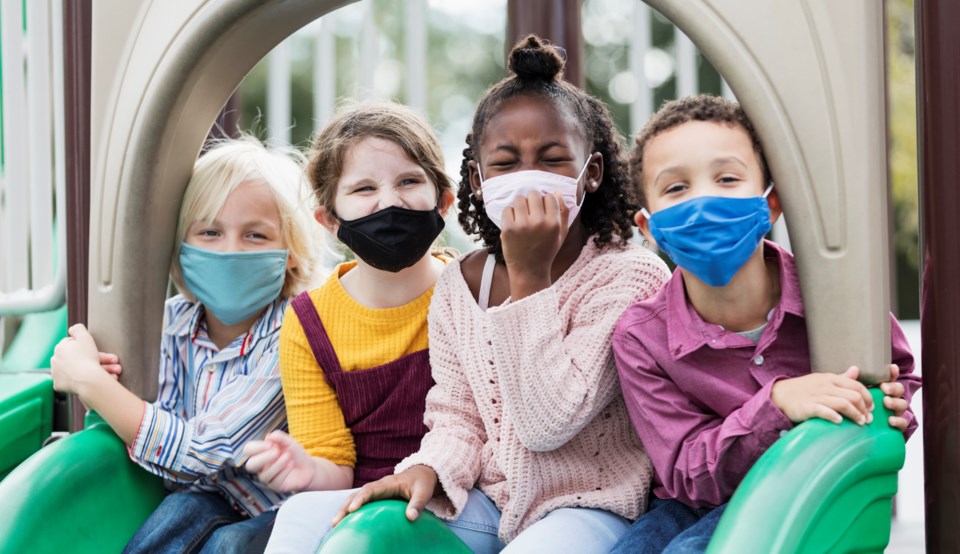The provincial government should reverse course on a plan to remove mask mandates in schools after spring break, says the advocacy group Safe Schools Coalition BC.
Citing Nova Scotia’s decision to keep masks on kids, B.C. should follow suit to prevent further COVID-19 infections, group leader Jen Heighton says.
“Education leaders must recognize that public schools are unique in this pandemic. Public schools are not a place where families and children can ‘manage their own risk.’ It is not the same as choosing to dine indoors at a restaurant or go to a movie theatre with unmasked people. Children must attend school,” wrote Heighton, a school teacher, in an open letter to government and education stakeholders.
On March 10, provincial health officer Dr. Bonnie Henry announced that once students and staff return from spring break, they will have the option of choosing whether or not to mask up.
“It has been a long and trying two years. Our masks have provided a level of comfort and protection. I want to assure you that I feel confident about what we’re doing and that we’re in place to do this now. These decisions are grounded in science,” said Henry at the time.
Henry has said mandates could return under a new wave of infections. Unless that happens the British Columbia School Trustees Association indicated to Glacier Media individual school boards will not be applying their own mandates, something the coalition had been hoping for.
"The lack of a provincial health order requiring masks for the health and safety of staff and students would make enforcing such a mandate challenging and opens the board to risks of liability," association spokesperson Mark Regier said Tuesday, via email.
Safe Schools Coalition BC, a group of parents, grandparents, and educators, says full vaccination rates for children 5-11 years old remains “stalled” at 30% and those under five remain unvaccinated.
There are roughly 517,000 kids up to age 10 in the province. It's unclear, due to lack of testing capacity, how many kids have had the virus pass through them.
Omicron infections have sent more kids to the hospital than since the start of the pandemic, the group notes in its letter. According to the BC Centre for Disease Control, since March 2020 up until Dec. 11, 2021, 172 kids under 10 went to hospital; from Dec. 11, 2021 to March 5, an additional 173 have been admitted to a hospital.
Pediatricians are worried about COVID-19's long-term effects, said Heighton, and the Omicron subvariant BA.2, which is rising in parts of Europe and Asia.
“Study after study shows that COVID-19 is a vascular disease, not a respiratory one, and that it results in damage to the brain, heart, lungs, nerves, and other organs, even after mild cases,” states the group, which claims to advocate “for evidence-based COVID-19 safety measures in British Columbia’s K-12 schools.”
The group cited a study by the National Institutes of Health; the study claims schools with mandatory masking during the Delta variant surge last fall had approximately 72% fewer cases of in-school transmission of the SARS-CoV-2 virus when compared to schools with optional or partial masking policies.
However, Heighton concedes there is no concrete evidence — at least yet — of mask effectiveness with the Omicron variant, which is much more transmissible. The group’s letter says Omicron may spread in the air like measles, according to some experts reported by the Daily Mirror.
Canada’s Chief Public Health Officer said in December a well-fitted respirator is the only sure means to prevent the spread of Omicron, as cloth masks are ineffective.
The use of cloth masks by children and whether they are worn effectively raises questions about the costs and benefits of masking children, particularly the youngest ones who are still developing foundational hearing, speaking and literacy skills. Jurisdictions across the world differ on their policies.
But Heighton says such concerns remain contentious and a report last week from NPR.org shows emerging research that could dismiss such concerns, largely raised by speech pathologists and audiologists.
And Heighton said it stands to reason masking can still prevent some virus particles from escaping into the air.
Asked if respirators are a reasonable and practical measure for the hundreds of thousands of B.C. students, Heighton said respirators may be reused if sanitized properly.
If they are not, however, dirty masks can become easily contaminated and spread not just coronavirus but others as well, research shows.
If the virus is escaping masks that are either inefficient or improperly worn by children, then this is all the more reason to add air purifiers and to upgrade air systems in schools, said Heighton, adding it's a simultaneous demand the group is making.
To improve ventilation in schools, the province said March 15 it is providing $48 million in 2022-23 to upgrade HVAC systems at 90 schools around B.C. Since the start of the pandemic, the Ministry of Education has provided $163.1 million in provincial and federal funding for HVAC upgrades.
Safe Schools Coalition BC concluded its letter, stating it “urges all education stakeholders and leaders to apply the precautionary principle to B.C.’s K-12 public schools and continue the mask mandate for this school year, so that all children can be safer from the BA.2 variant as well as future variants.”
The group also claims COVID prevention is a human rights issue.



